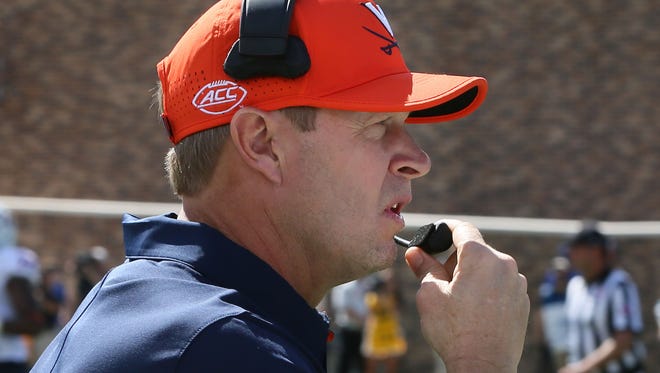What you find in a college football coach's contract buyout
For some football head coaches, getting fired for not winning enough games is a pretty straightforward proposition: Turn in your university property, vacate your office and collect whatever buyout money you’re owed over the time frame prescribed by your contract.

If you want to pick up some extra money by taking another job, fine. If you don’t, that’s OK too.
For many other coaches, it’s not nearly as simple.
USA TODAY Sports coaches salary database
Here are some examples of how firings can involve a lot more than cashing checks from a former employer.
***
Buyout provisions can come with a variety of strings attached. The most common is a duty to make a good-faith effort to find another job, with the income from that job offsetting the amount owed to the coach by the school that fired him.
But even that can get complicated.
► In exchange for continuing to get paid over the remaining term of his contract, Virginia’s Bronco Mendenhall would be required to seek other “gainful employment,” unless this requirement is waived in writing by Virginia’s athletics director. In addition, he would be required to report monthly to Virginia’s athletics director “on any gainful employment or consulting arrangement, and on employment applications and progress in actively seeking other employment.”
Once Mendenhall gets a new job, if he “appears to be substantially underpaid compared to market” or he gets a multi-year contract under which the pay is “unequally apportioned” so that it increases after Virginia’s payments to him end, Virginia is allowed to assign a value to the new deal based on the market “to achieve the appropriate reduction” of its payments to Mendenhall.
Alternatively, Virginia could decide to make a lump sum payment to Mendenhall for the total amount he would be owed, in which case he would have no reporting obligation or duty to seek employment elsewhere.
Hiring a college football coach is expensive. Firing one is, too.
► Illinois’ Lovie Smith would need to make reasonable efforts to find a job “commensurate with his experience,” but he “shall not be required to accept an employment or consulting offer that (he) reasonably regards as unacceptable.”
► California’s Sonny Dykes would have to make efforts find work as “a BCS level head coach or coordinator.”
► Indiana’s Kevin Wilson would be required to seek a “comparable position or opportunity,” which his contract defines as a “media commentator with a national or regional network, broadcast station or cable company, professional football assistant or head coach, assistant or head football coach at a Division I” school. In addition, he is required to report to Indiana on a quarterly basis all compensation “earned by him (or by any of his affiliates)”.
PHOTOS: BUYOUTS OF COACHES ON HOT SEATS

► Ball State would make Mike Neu seek a job as a Division I head coach or offensive or defensive coordinator, or as an NFL head or assistant coach. However, his buyout would be reduced on a monthly basis by income not only from one of those jobs, but also if he finds new employment as a “college, prep school, or high school football coach or a NFL scout.”
► If Oregon State fires Gary Andersen, in order to confirm that he is accurately reporting the income from another source that would reduce the buyout payments being paid to him, the university would have the right to request from him copies of his relevant tax records, including a copy of his IRS 1040 Form, for any year during which he receives buyout money.
***
Most schools that require coaches to make efforts to find new jobs then need to pay the coach only the difference between his new income and the amount he would have gotten from the school that fired him. But not always.
► Texas coach Charlie Strong’s buyout would be reduced by only 50% of the total compensation he received in a new position.
► Georgia coach Kirby Smart’s buyout would be reduced by “any and all compensation” he would get “for services performed in any position” at another Southeastern Conference school. The contract does not address whether his buyout would be affected by income from a job at school in another conference.
► Jim McElwain’s buyout from Florida would be reduced if, within 90 days of his termination, he “accepts employment” with another SEC school. The terms under which this reduction would occur are addressed in a separate appendix to his contract that run more than one full page.
***
In addition, a number of schools make any buyout pay conditional on the departing coach’s willingness to sign a comprehensive release form under which they agree not to take variety of actions against the school or its affiliates.
► The release in the contract between McElwain and Florida would prevent McElwain or his heirs from taking action against — among others — the athletics department, “the Florida Board of Governors, the University and each their respective controlled affiliated entities, and each such body’s and entity’s respective former, current and future trustees, directors, board members, officers, employees, agents, students, contractors and attorneys.”
► Ohio State’s agreement with Urban Meyer includes, as a separate exhibit, a sample release document that could be used in its exact form. It is six pages long. And it closes with a signature page topped by a sentence entirely in bold capital letters that reads in part: “BY SIGNING BELOW EACH PARTY REPRESENTS THAT THEY HAVE READ THIS ENTIRE AGREEMENT … AND OF THEIR OWN FREE WILL VOLUNTARILY AGREE TO BE BOUND BY THE AGREEMENT.”
